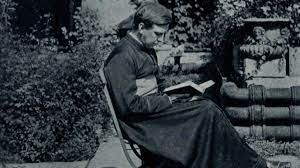The Baptists are the subject of the next section in Benson’s book, Noncatholic Denominations. He notes that they developed from a people called the “Anabaptists,” who go back to the start of the Reformation. Their organization took a while to gel, but by the mid-17th century, they were an important force in England and had significant influence with the Puritans of Cromwell’s Commonwealth. They were, naturally, Calvinist, and they have worked hard among the poor and in the missions (162). In latter years, their missionary work has been controversial, and has abated.
Their theological positions can be called “evangelical,” being distinguished by two things: first, in organizational terms, they are based on the local Congregation – we have already examined what this means. Like the Congregationalists, they have a union of local congregations. For a long time they fell into two branches, the “Particular” who were strict Calvinist, and the “General” who were not. In England these amalgamated, and the Calvinist line has been disappearing (162-163). Also typical of these congregations in Benson’s time was they had not been much influenced by “modern heterodoxy” (163). The second distinguishing element is the one which gave them their name: they baptise only adults, and then, by full immersion, following on evidence of “conversion.” Benson says that they: “maintain the solemnity and the importance of the sacrament, although they cannot be said to regard it as more than a very significant symbol of a spiritual fact … (believing that) immersion sets forth the fellowship of the believer with the Lord in His death (by which He puts away sin) and His Resurrection (by which He ever liveth to fulfil the Divine purpose)” (163). Benson is here quoting one of their catechisms.
Their teaching on baptism made them very unpopular with other Protestants: which does not speak very highly for those Protestants’ respect for their own principle of individual interpretation of Scripture. Notoriously, Luther repudiated their belief in these terms: “Who sees not in such Anabaptists, not men possessed, but demons possessed by worse demons?” Yet, the Baptists themselves fall into the “fallacy of thinking that written Scriptures, and especially the words of Christ, are so obvious in their meaning as to need no authoritative interpretation” (166). Luther’s imagination was truly notable.
Benson notes that it is odd that while they did think baptism more than a symbol, yet they had strong views on how that “symbol” should be administered: for them, baptism had to be immersion, meaning full body immersion (164). Their main spiritual principle is what Benson calls “spirituality,” that is, “the personal responsibility of the soul to God.” This is why they eject infant baptism, i.e. because they do not accept that infants have the personal responsibility, or capacity to receive it, for “active co-operation with grace is, in their opinion, always necessary to its reception …” (165) It is interesting how Protestants do not accept what they think of as the Catholic theology of “works,” but, by a sleight of hand, they do not consider “active co-operation” to be a work.
As for their approach to Scripture, they were in Benson’s time, without “that spirit of modern ‘progressiveness’ that is so much undermining the roots of orthodoxy elsewhere. They are old-fashioned rather than ‘advanced’; they appeal to the past rather than to the future. … There is, in fact, in their spirit, a certain clarity and dogmatism which their enemies describe as ‘hardness’; there is not in them much of that invertebrate modernism that prevails so largely elsewhere.” (165) Once more, Benson’s use of English is remarkable: “invertebrate modernism.” Also unforgettable is his final pen-portrait of the average Baptist: “He is generally utterly convinced of his own absolute orthodoxy, and of the heterodoxy of everyone else” (166).
On this occasion, I decided to check Benson’s work against other authorities. It was worthwhile, not only because I learnt more about the Baptists, but because it showed that Benson was entirely correct, as of the time he was writing. Further, he had put his finger on the very issues which were to erupt in Baptist history, at least in England. He had not, of course, dealt with the USA, but it is there that the Baptists encountered other problems. For example, the Baptists in the USA had initially been against slavery, but later formed the Southern Baptist Convention in 1845, which had come to an accommodation with it. Since I had always thought that the Baptist tradition was strong among African Americans, e.g. Martin Luther King Jr had been a Baptist minister, I was surprised. But it turns out that together and often under the supervision of White Baptist Congregations, the African Americans had their own Baptist congregations. In fact, according to the Pew Research group, in 2007, some 45% of all African Americans claim to be Baptists.
However, in the USA, the Modernist crisis struck the Baptists hard, and in the North, practically won out, with the inevitable results: in the early 1980s it had about 1,600,00 members, but by 2020 this had fallen to 1,126,527. This is astonishing: a more than 25% decline in less than forty years. On that basis, it will practically vanish in a hundred years. When I looked into its history, I was not shocked to find that the roots of the evil went back into its history. The teaching of Universalism (that everyone will be saved) was championed by a Baptist minister from New England, named Hosea Ballou (1771-1852). If everyone is saved, why should I follow any rules of God? I would surely pay more attention to human considerations, for people will certainly not be so indulgent as God. Sometimes in religion, if one side wins the argument, it destroys the faith.
